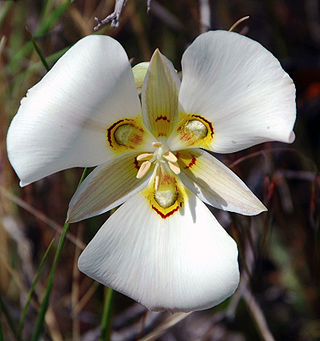
Calochortus is a genus of flowering plants in the lily family. The group includes herbaceous, perennial and bulbous species, all native to North America.

Calochortus nuttallii, also known as the sego lily, is a bulbous perennial plant that is endemic to the Western United States. The common name of sego comes from a similar Shoshone word. It is the state flower of Utah.

Calochortus striatus, known by the common name alkali mariposa lily, is a species of mariposa lily native to California and into Nevada.
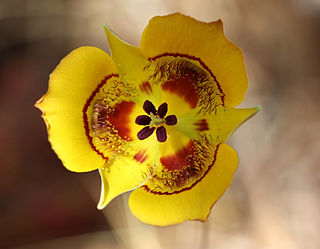
Calochortus clavatus is a species of mariposa lily known by the common name clubhair mariposa lily. It is endemic to California where it is found in forests and on chaparral slopes.

Androstephium breviflorum is a species of flowering plant known by the common names pink funnel lily and small flowered androstephium.

Calochortus dunnii is a rare species of flowering plant in the lily family known by the common name Dunn's mariposa lily.

Calochortus elegans is a species of flowering plant in the lily family known by the common name elegant Mariposa lily, cat's ear, elegant cat's ears or star tulip. It is native to the western United States from northern California to Montana.
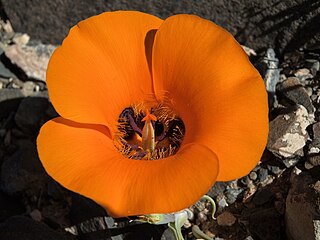
Calochortus kennedyi is a North American species of flowering plant in the lily family known by the common name desert mariposa lily.

Calochortus nudus is a North American species of flowering plant in the lily family known by the common name naked mariposa lily.
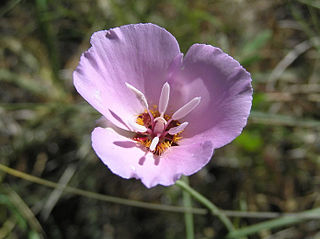
Calochortus palmeri is a species of flowering plant in the lily family known by the common names Palmer's mariposa lily and strangling mariposa.

Calochortus panamintensis is a rare North American species of flowering plants in the lily family known by the common name Panamint mariposa lily. It is native to Inyo and Kern Counties in California, plus adjacent Nye County, Nevada. It is named after the Panamint Range near Death Valley.

Calochortus persistens is a rare North American species of flowering plant in the lily family known by the common name Siskiyou mariposa lily. It is native to northern California and southern Oregon.

Calochortus simulans is a California species of flowering plant in the lily family known by the common name San Luis Obispo mariposa lily, not to be confused with the San Luis mariposa lily C. obispoensis.

Calochortus syntrophus is a rare species of flowering plant in the lily family known by the common names Callahan's mariposa lily and clustered mariposa lily. It is endemic to northern California, where it occurs in a remote area north of Montgomery Creek in Shasta County. It has also been spotted in adjacent Tehama County. Its habitat includes open, rocky areas with moist or wet soils in oak woodland territory. It was first discovered in 1993 and its description was published the following year.

Calochortus umpquaensis is a species of flowering plant in the lily family known by the common name Umpqua mariposa lily. It is endemic to Oregon in the United States, where it is mainly limited to the region of the Klamath Mountains on the Little River in Douglas County, in particular the Watson and Ace Williams Mountains. The flower has also been found at a single location in each of Josephine and Jackson Counties.
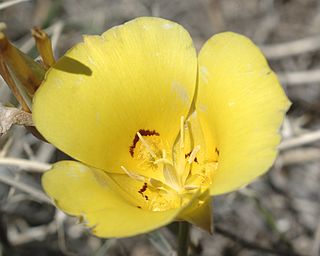
Calochortus aureus is a North American species of flowering plants in the lily family. It is native to the southwestern United States. Calochortus aureus is a bulb-forming perennial herb producing a single stalk up to 30 cm tall. Flowers are bright lemon-yellow with red or purple splotches on the petals.

Calochortus eurycarpus is a North American species of flowering plant in the lily family. It is native to the western United States: Montana, Idaho, eastern Oregon, western Wyoming, northeastern Nevada and southeastern Washington.

Calochortus gunnisonii commonly known as Rocky Mountain mariposa or Gunnison mariposa lily is a North American species of flowering plant in the lily family. It is native to the western United States, primarily in the Rocky Mountains and Black Hills: Arizona, New Mexico, Utah, Colorado, Wyoming, Montana, South Dakota, Washington state (Grant County, northwestern Nebraska and eastern Idaho.

Calochortus longibarbatus is a species of flowering plant in the lily family with the common names long-haired star-tulip and longbeard mariposa lily. It is native to Oregon, Washington, and northern California, where it grows in the forest and woodlands of the mountains.

Ellen Louella (Nellie) Powell Thompson (1840–1911) was an American naturalist and botanist, and an active advocate for women's suffrage.



















